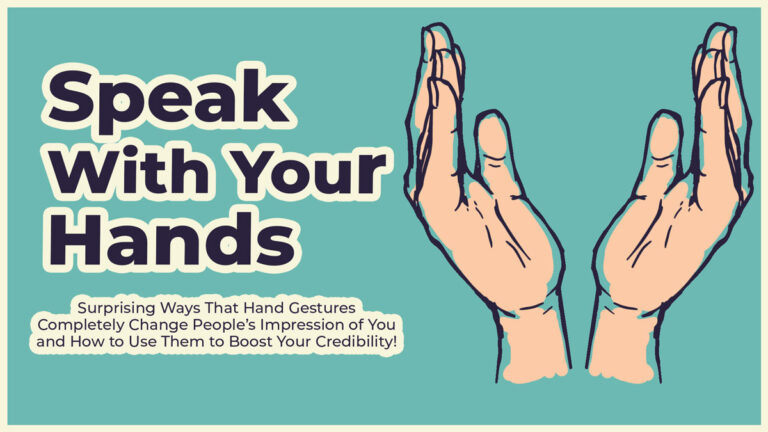Imagine standing in front of a crowd, your heart pounding and your mind racing.
You feel the familiar surge of anxiety, but instead of worrying, you harness that energy into a compelling and engaging speech.
This transformation from nervousness to excitement is achievable with practical and actionable tips.
Here are 7 tips that will help you overcome your nerves and deliver your speech with confidence and enthusiasm.
1. Reframe your Mindset
Visualise your anxiety as a friend cheering you on rather than an enemy holding you back.
Instead of thinking, “I’m so nervous, I can’t do this” try telling yourself, “I’m excited to share my ideas with this audience.”
This simple shift in perspective can change how you perceive your physiological responses to stress, such as a racing heart or sweaty palms, viewing them as signs of anticipation rather than fear.
Anxiety and excitement are physiologically similar, so reframe your mindset to view your symptoms as excitement.
Embrace the adrenaline rush as a sign that you are ready to perform.
This mental adjustment can significantly improve your public speaking experience.
Remember, your mind believes what you tell it.

2. Prepare Thoroughly
Think of preparation as building a strong foundation for your speech.
Practise your speech multiple times, record yourself, and watch the playback to identify areas for improvement.
The more familiar you are with your content, the more confident you’ll feel when it’s time to present.
Thorough preparation reduces uncertainty, which is a major cause of anxiety.
It allows you to anticipate potential questions and prepare your responses.
Knowing your material inside and out will help you stay calm and focused.
Preparation breeds confidence, so invest time in it.

3. Imagine Your Success
Visualise yourself standing confidently on stage, engaging with the audience.
Spend a few minutes each day imagining a successful presentation.
Picture the audience reacting positively, laughing at your jokes, and applauding at the end.
This mental rehearsal can boost your confidence and reduce anxiety.
Visualisation helps program your mind for success and builds your confidence.
It trains your brain to perform the way you want during the actual event.
The more vividly you visualise, the more real it will feel.

4. Practise Deep Breathing
Imagine your breath as a calming wave washing over your nerves.
Before you start speaking, take a few deep breaths in through your nose, hold for a few seconds, and exhale slowly through your mouth.
Deep breathing helps calm your nervous system and reduces physical symptoms of anxiety.
It increases oxygen flow to your brain, helping you think more clearly.
Practise this technique whenever you feel anxious.
It’s a simple yet effective way to regain control.
Deep breaths can be your secret weapon.

5. Engage with Your Audience
Picture the audience as your supportive friends eager to hear what you have to say.
Make eye contact, smile, and interact with them to create a connection.
Engaging with your audience can help shift your focus from your own anxiety to delivering value to them.
It makes the experience more conversational and less intimidating.
Audience engagement fosters a sense of connection and support.
The more connected you feel, the more relaxed you’ll be.
Treat your speech as a dialogue, not a monologue.

6. Use Positive Self-Talk
Think of your self-talk as your personal cheerleader.
Replace negative thoughts with positive affirmations such as, “I am well-prepared and confident.” or “I can do this.”
Positive self-talk can boost your self-esteem and reduce anxiety.
It helps counteract the fear-based thoughts that fuel anxiety.
By reinforcing positive beliefs, you create a more confident mindset.
Practise this regularly to build a habit of positivity.
Your words have power so use them wisely.

7. Focus on the Message, Not Yourself
Imagine your message as a gift you are eager to share with your audience.
Shift your focus from your own nervousness to the value you are providing to your listeners.
When you concentrate on delivering your message effectively, your anxiety naturally diminishes.
Remember that the audience is there to learn from you.
Your message is more important than your fear.
Keep the audience’s needs in mind and tailor your speech to benefit them.
This focus will make you more engaging and less self-conscious.

Believe in Yourself and Practise with Your Newfound Confidence
By implementing these strategies, you can transform your public speaking anxiety into excitement and confidence.
Remember, even seasoned speakers feel nervous, but they have learned to channel that energy positively.
With practise and perseverance, you can too.
Embrace these tips, and let your next speaking opportunity be a showcase of your newfound confidence.
Turn your fear into fuel, and let your voice shine.
Believe in yourself and your message because you have something valuable to share.
Now, go out there and captivate your audience!


